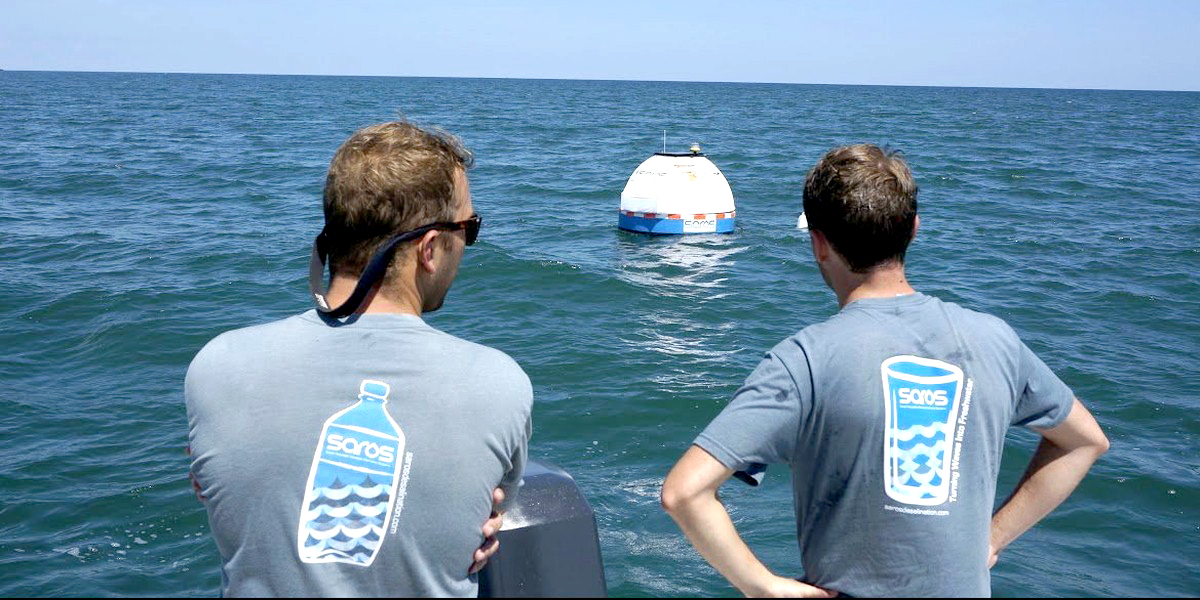

North Carolina-based startup EcoH2O Innovations has created the first-ever desalination buoy that only uses the power of waves to turn seawater into drinking water.
Engineers Justin Sonnett and Chris Matthews claim that a single Swell Actuated Reverse Osmosis System (SAROS) machine can clean 3,500 gallons of seawater a day. A grouping of 10-20 units can provide up to 50,000 gallons per site.
According to CityLab, the SAROS “draws in sea water, pumps it at high pressure through a reverse-osmosis membrane, and emits clean, drinkable water, which it stores in a tank until it’s ready to be run back to shore.”
Desalination plants are a potential solution for water scarcity but they have several problems—they require a large swath of land and city infrastructure, have a big brine discharge problem and also require fossil fuels to operate. The portable SAROS, however, can fit in the back of a truck only needs waves to run, making it relatively cost-effective and energy independent.
“SAROS is different because, by using it, we can cut the cost currently associated with producing fresh water in half,” Matthews, SAROS director of research and development, told New Atlas.
The system was designed for the 230 million people living on island and coastal communities that lack access to potable water.
“Typical desalination processes can be taxing on the environment, especially coastal communities,” the team said. “Unlike traditional methods that require a huge amount of power, typically generated by burning fuel oil, SAROS uses clean, renewable wave energy and produces zero emissions and minimal salt brine concentration.”
Besides providing a constant source of clean water, the SAROS can help island nations curb their use of dirty energy. Many of these areas are bearing the brunt of climate change, from natural disasters to sea level rise.
“We’re completely removing the dependency on electricity and fossil fuels, and creating one of the first environmentally conscious desalination systems that will allow us to bring affordable fresh water to coastal areas across the globe,” the team added.
#Problem: 233 million people living in coastal regions & #islands don't have access to #CleanWater. #Answer: SAROS. https://t.co/Y93kBlHw9n pic.twitter.com/BfRWDgFVHR
— SAROS Desalination (@SAROSDesal) October 24, 2016
EcoH2O said the SAROS can one day be used to tackle other problems besides water scarcity.
“The innovative, wave-powered technology used in SAROS could also be configured to do things like generate electricity, autonomously pump water to clean up oil spills or even filter plastic from our ocean,” the team said. “The amount of potential good that SAROS can bring is as exciting as it is endless.”
Sonnett and Matthews came up with SAROS as their senior design project at the University of North Carolina at Charlotte in 2014. After graduating, they’ve picked up multiple awards for their concept, including the prestigious Thomas Edison Award in 2014 for dedication to sustainability.
The SAROS team has launched an Indiegogo crowdfunding campaign to raise the $25,000 they need to take this project above water. The cost per unit is expected to retail around $23,000.
Watch here to learn more:

 233k
233k  41k
41k  Subscribe
Subscribe 